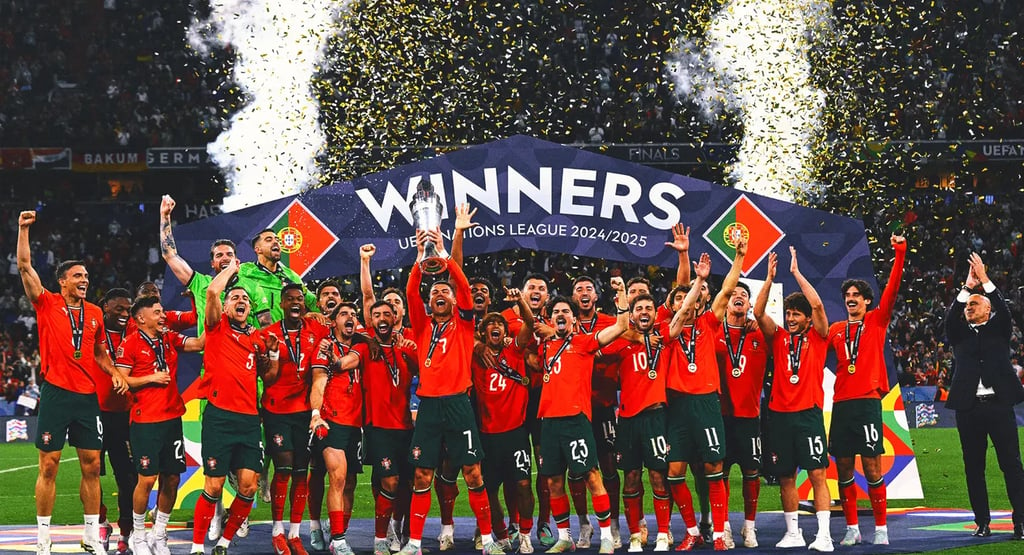Portugal Claims UEFA Nations League Title After Thrilling Penalty Shootout Against Spain
SPORT
6/8/20254 min read


Match Overview
The UEFA Nations League final between Portugal and Spain encapsulated the competitive spirit and high stakes typical of such prestigious matches. The atmosphere in the stadium was electric, with supporters passionately rallying for their teams. As the whistle blew to mark the start of the match, it was clear that both teams were ready to give it their all.
The first half was a display of disciplined tactics and skilled maneuvers, yet neither side managed to break the deadlock. Portugal played with intensity, displaying their characteristic flair, while Spain maintained possession, showcasing their methodical style of play. As the teams entered the second half, the pressure intensified, and the first goal came shortly thereafter. In the 60th minute, Portugal took the lead, sending their fans into jubilation.
In the extra time period, both teams struggled to find the decisive advantage, with tired legs eventually dictating the pace of the game. Every pass was scrutinized, and each player's movements became crucial, as the seconds ticked away, setting the stage for the imminent penalty shootout that would determine the champion of the UEFA Nations League. This gripping encounter showcased the caliber of both teams, making the concluding penalty drama all the more compelling.
Key Player Performances
The UEFA Nations League final between Portugal and Spain showcased exceptional performances from several key players, with Cristiano Ronaldo and Ruben Neves emerging as pivotal figures in their team's triumph. Ronaldo, renowned for his goal-scoring prowess, demonstrated his influence once again by netting the equalizer in the second half. This crucial goal not only reignited Portugal's chances of winning the match but also underscored Ronaldo’s status as a vital leader on the field. However, his involvement came to an abrupt halt when he succumbed to injury, raising concerns about the impact on his team's morale. Despite his exit, Ronaldo's earlier contribution served as a catalyst for the Portuguese squad, proving that his presence is felt even when he is no longer on the pitch.
On the other hand, Ruben Neves solidified his reputation as a composed and reliable midfielder during this high-pressure match. With the scoreline reaching a tense climax, Neves stepped up to take the decisive penalty, illustrating remarkable composure under extreme pressure. His success in converting the penalty not only clinched the title for Portugal but also highlighted his ability to perform when stakes are highest. Neves' contributions transcended the penalty itself; throughout the match, he displayed great skill and vision, controlling the tempo and providing essential support in both defensive duties and transition play.
Beyond these standout performances, other players such as Bernardo Silva and João Félix played crucial roles, executing their responsibilities effectively. Silva's creativity and Félix's agility troubled the Spanish defense, making significant contributions to Portugal's tactical play. Collectively, these performances exemplified the team's unity and determination, ultimately leading Portugal to claim the UEFA Nations League title in a memorable encounter. This match will certainly be remembered for demonstrating the depth of talent present within the Portuguese squad.
Penalty Shootout Drama
The UEFA Nations League final between Portugal and Spain culminated in a gripping penalty shootout that underscored the high stakes involved in this prestigious tournament. As the match concluded with a deadlock after 90 minutes and extra time, both teams entered the shootout filled with anticipation and anxiety. This tense scenario set the stage for a dramatic display of skill and nerves.
The first few penalties saw both teams demonstrating exceptional composure. Spain's first shooter, a talented forward, confidently converted their opening kick. However, Portugal responded effectively, equalizing quickly through their ace penalty taker. The atmosphere was electric, as each successful strike elevated the pressure on the opposing team. Notably, the Spanish goalkeeper showcased remarkable reflexes, executing an outstanding save against one of Portugal’s most reliable shooters, further escalating the drama surrounding the event.
Match Highlights and Reactions
The UEFA Nations League final between Portugal and Spain offered a captivating spectacle that will long be remembered by football fans. One of the standout moments occurred in the first half when Portugal’s João Félix delivered an impressive strike, hitting the crossbar and showcasing his skills. Moments later, Spain responded with a brilliant save from Portugal’s goalkeeper, Diogo Costa, who denied a close-range effort from Álvaro Morata, thus keeping the score level.
As the match unfolded, tensions heightened, culminating in a frenetic second half wherein both teams battled fiercely for supremacy. The pivotal moment came late in regulation time when Portugal was awarded a free-kick in a dangerous position. The ensuing set piece saw Bruno Fernandes expertly curl the ball towards the far post, only for it to be cleared by Spain’s formidable defense, illustrating the intensity of the encounter.
Fans in the stadium and those watching from home were on the edge of their seats as the game went into a penalty shootout, reflecting the competitive nature of both teams. Each player displayed immense pressure, yet the composure of Portugal's penalty takers was profound. Fans erupted with joy when Spain’s last penalty was saved by Costa, sealing Portugal’s victory and prompting euphoric celebrations from players and supporters alike.
Post-match comments highlighted the significance of this win for Portugal, with coach Roberto Martínez lauding the team's resilience and determination throughout the tournament. Conversely, Spain’s coach, Luis de la Fuente, expressed pride in his squad's performance despite the disappointing outcome. The triumph reinforces Portugal's position in European football, while Spain will need to regroup and analyze their performance moving forward, as both teams look ahead to future competitions within the UEFA framework.
